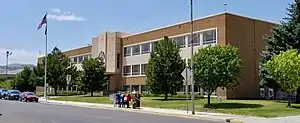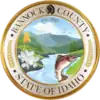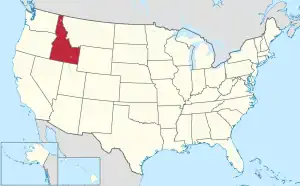Bannock County, Idaho
Bannock County is a county in the southeastern part of Idaho. As of the 2020 Census, the population was 87,018,[1] making it the sixth-most populous county in Idaho. The county seat and largest city is Pocatello.[2] The county was established in 1893 and named after the local Bannock tribe.[3] It is one of the counties with territories included in the Fort Hall Indian Reservation of the federally recognized Shoshone-Bannock Tribes.
Bannock County | |
|---|---|
 Bannock County Courthouse in Pocatello | |
 Seal | |
 Location within the U.S. state of Idaho | |
 Idaho's location within the U.S. | |
| Coordinates: 42°40′N 112°13′W | |
| Country | |
| State | |
| Founded | March 6, 1893 |
| Named for | Bannock tribe |
| Seat | Pocatello |
| Largest city | Pocatello |
| Area | |
| • Total | 1,147 sq mi (2,970 km2) |
| • Land | 1,112 sq mi (2,880 km2) |
| • Water | 35 sq mi (90 km2) 3.1% |
| Population (2020) | |
| • Total | 87,018 |
| • Density | 76/sq mi (29/km2) |
| Time zone | UTC−7 (Mountain) |
| • Summer (DST) | UTC−6 (MDT) |
| Congressional district | 2nd |
| Website | www |
Geography
According to the U.S. Census Bureau, the county has a total area of 1,147 square miles (2,970 km2), of which 1,112 square miles (2,880 km2) is land and 35 square miles (91 km2) (3.1%) is water.[4] The Portneuf River flows through the county, meeting the Snake River (the American Falls Reservoir) at the county's lowest point, its northwestern corner. Bonneville Peak, on the eastern border in the Portneuf Range, is the county's highest point at 9,271 feet (2,826 m) ASL; on its western slopes is the Pebble Creek ski area.
Adjacent counties
- Bingham County - north
- Caribou County - east
- Franklin County - southeast
- Oneida County - southwest
- Power County - west
Highways
 - Interstate 15
- Interstate 15 - Interstate 86
- Interstate 86 - US 30
- US 30 - US 91
- US 91 - SH-40
- SH-40
National protected area
- Caribou National Forest (part)
Demographics
| Census | Pop. | Note | %± |
|---|---|---|---|
| 1900 | 11,702 | — | |
| 1910 | 19,242 | 64.4% | |
| 1920 | 27,532 | 43.1% | |
| 1930 | 31,266 | 13.6% | |
| 1940 | 34,759 | 11.2% | |
| 1950 | 41,745 | 20.1% | |
| 1960 | 49,342 | 18.2% | |
| 1970 | 52,200 | 5.8% | |
| 1980 | 65,421 | 25.3% | |
| 1990 | 66,026 | 0.9% | |
| 2000 | 75,565 | 14.4% | |
| 2010 | 82,839 | 9.6% | |
| 2020 | 87,018 | 5.0% | |
| 2021 (est.) | 88,263 | [5] | 1.4% |
| US Decennial Census[6] 1790-1960[7] 1900-1990[8] 1990-2000[9] 2010-2020[10] 2020[11] | |||
Bannock County is part of the Pocatello, Idaho Metropolitan Statistical Area.
2000 census
As of the 2000 United States Census,[12] there were 75,565 people, 27,192 households, and 19,224 families in the county. The population density was 68 inhabitants per square mile (26/km2). There were 29,102 housing units at an average density of 26 per square mile (10/km2). The racial makeup of the county was 91.29% White, 0.59% Black or African American, 2.91% Native American, 0.99% Asian, 0.16% Pacific Islander, 2.08% from other races, and 1.98% from two or more races. 4.68% of the population were Hispanic or Latino of any race. 23.1% were of English, 14.2% German, 11.1% American, and 7.4% Irish ancestry.
There were 27,192 households, out of which 36.50% had children under the age of 18 living with them, 56.70% were married couples living together, 10.00% had a female householder with no husband present, and 29.30% were non-families. 22.80% of all households were made up of individuals, and 7.60% had someone living alone who was 65 years of age or older. The average household size was 2.69 and the average family size was 3.20.
The county population contained 28.10% under the age of 18, 14.60% from 18 to 24, 27.20% from 25 to 44, 20.00% from 45 to 64, and 10.10% who were 65 years of age or older. The median age was 30 years. For every 100 females, there were 97.70 males. For every 100 females aged 18 and over, there were 94.40 males.
The median income for a household in the county was $36,683, and the median income for a family was $44,192. Males had a median income of $36,056 versus $23,595 for females. The per capita income for the county was $17,148. About 9.80% of families and 13.90% of the population were below the poverty line, including 15.60% of those under age 18 and 7.60% of those aged 65 or over.
2010 census
As of the 2010 United States Census, there were 82,839 people, 30,682 households, and 20,836 families in the county.[13] The population density was 74.5 inhabitants per square mile (28.8/km2). There were 33,191 housing units at an average density of 29.8 per square mile (11.5/km2).[14] The racial makeup of the county was 89.8% white, 3.2% American Indian, 1.3% Asian, 0.8% black or African American, 0.2% Pacific Islander, 2.1% from other races, and 2.7% from two or more races. Those of Hispanic or Latino origin made up 6.7% of the population.[13] In terms of ancestry, 23.4% were English, 16.9% were German, 9.3% were Irish, and 7.0% were American.[15]
Of the 30,682 households, 35.5% had children under the age of 18 living with them, 52.2% were married couples living together, 10.7% had a female householder with no husband present, 32.1% were non-families, and 24.9% of all households were made up of individuals. The average household size was 2.64 and the average family size was 3.17. The median age was 31.4 years.[13]
The median income for a household in the county was $44,848 and the median income for a family was $54,650. Males had a median income of $43,538 versus $28,870 for females. The per capita income for the county was $21,275. About 10.6% of families and 14.0% of the population were below the poverty line, including 16.6% of those under age 18 and 4.2% of those aged 65 or over.[16]
Government and politics
The last Democratic candidate for President to win the county was Lyndon B. Johnson in 1964,[17] although subsequent Republican victories have been by smaller margins than those in neighboring counties, due to the presence of Idaho State University. The closest a Democrat has gotten to winning Bannock County since 1964 was in 1992 when Bill Clinton lost to George H. W. Bush by 2.9 percent.
| Year | Republican | Democratic | Third party | |||
|---|---|---|---|---|---|---|
| No. | % | No. | % | No. | % | |
| 2020 | 23,331 | 58.65% | 14,682 | 36.91% | 1,770 | 4.45% |
| 2016 | 17,180 | 51.41% | 10,342 | 30.95% | 5,894 | 17.64% |
| 2012 | 21,010 | 59.14% | 13,214 | 37.20% | 1,299 | 3.66% |
| 2008 | 19,356 | 54.62% | 14,792 | 41.74% | 1,289 | 3.64% |
| 2004 | 21,479 | 61.64% | 12,903 | 37.03% | 462 | 1.33% |
| 2000 | 18,223 | 59.07% | 10,892 | 35.30% | 1,737 | 5.63% |
| 1996 | 14,058 | 44.80% | 12,806 | 40.81% | 4,513 | 14.38% |
| 1992 | 12,016 | 37.30% | 11,091 | 34.43% | 9,104 | 28.26% |
| 1988 | 14,986 | 52.40% | 13,074 | 45.71% | 541 | 1.89% |
| 1984 | 18,742 | 65.77% | 9,399 | 32.98% | 355 | 1.25% |
| 1980 | 18,477 | 61.88% | 8,639 | 28.93% | 2,743 | 9.19% |
| 1976 | 13,172 | 53.65% | 10,261 | 41.80% | 1,117 | 4.55% |
| 1972 | 12,856 | 57.93% | 7,840 | 35.33% | 1,495 | 6.74% |
| 1968 | 10,234 | 47.97% | 9,084 | 42.58% | 2,016 | 9.45% |
| 1964 | 7,825 | 36.72% | 13,483 | 63.28% | 0 | 0.00% |
| 1960 | 9,157 | 42.11% | 12,586 | 57.89% | 0 | 0.00% |
| 1956 | 10,476 | 53.51% | 9,101 | 46.49% | 0 | 0.00% |
| 1952 | 10,864 | 55.25% | 8,771 | 44.61% | 27 | 0.14% |
| 1948 | 5,580 | 35.86% | 9,679 | 62.20% | 301 | 1.93% |
| 1944 | 5,413 | 35.84% | 9,681 | 64.09% | 11 | 0.07% |
| 1940 | 5,419 | 34.05% | 10,493 | 65.94% | 1 | 0.01% |
| 1936 | 3,830 | 28.60% | 9,443 | 70.51% | 120 | 0.90% |
| 1932 | 4,676 | 35.81% | 8,271 | 63.34% | 112 | 0.86% |
| 1928 | 5,297 | 53.22% | 4,602 | 46.24% | 54 | 0.54% |
| 1924 | 4,520 | 44.99% | 1,612 | 16.05% | 3,914 | 38.96% |
| 1920 | 4,871 | 62.00% | 2,986 | 38.00% | 0 | 0.00% |
| 1916 | 2,950 | 40.10% | 4,084 | 55.52% | 322 | 4.38% |
| 1912 | 2,316 | 48.04% | 1,486 | 30.82% | 1,019 | 21.14% |
| 1908 | 2,690 | 56.75% | 1,892 | 39.92% | 158 | 3.33% |
| 1904 | 2,826 | 68.58% | 1,063 | 25.79% | 232 | 5.63% |
| 1900 | 1,684 | 51.58% | 1,581 | 48.42% | 0 | 0.00% |
Similar to other Idaho counties, an elected three-member county commission heads the county government. Other elected officials include clerk, treasurer, sheriff, assessor, coroner, and prosecutor.[19]
Like other eastern Idaho counties, Bannock County has a significant Latter Day Saint population which tends to strongly vote Republican. However, a substantial trade union presence in the county - as well as the Idaho State University community - often gives Democrats an overall advantage, especially in local races. Bannock County routinely elects more Democrats than Republicans to county-level offices.
At the state level, Bannock County is located in Legislative Districts 28 and 29.[20] Democrats currently control two of these six seats in the Idaho Legislature.[21] In 2016, Republicans were able to win House Seat A in District 29.
Idaho Department of Correction operates the Pocatello Women's Correctional Center (PWCC) in Pocatello and in Bannock County.[22]
Communities
Education
School districts include:[27]
- Grace Joint School District 148
- Marsh Valley Joint School District 21
- Pocatello/Chubbuck School District 25
- Preston Joint School District 201
- West Side Joint School District 202
There is also a Bureau of Indian Education (BIE)-affiliated school, Shoshone Bannock Jr./Sr. High School.
See also
References
- "Idaho Counties by Population". Idaho Demographics. Austin, TX: Cubit Planning. Retrieved January 30, 2022.
- "Find a County". National Association of Counties. Archived from the original on May 31, 2011. Retrieved June 7, 2011.
- Idaho.gov - Bannock County Archived August 10, 2009, at the Wayback Machine - accessed May 31, 2009
- "US Gazetteer files: 2010, 2000, and 1990". US Census Bureau. February 12, 2011. Retrieved April 23, 2011.
- "County Population Totals: 2010-2020". Retrieved September 17, 2022.
- "US Decennial Census". US Census Bureau. Retrieved June 28, 2014.
- "Historical Census Browser". University of Virginia Library. Retrieved June 28, 2014.
- "Population of Counties by Decennial Census: 1900 to 1990". US Census Bureau. Retrieved June 28, 2014.
- "Census 2000 PHC-T-4. Ranking Tables for Counties: 1990 and 2000" (PDF). US Census Bureau. Archived (PDF) from the original on March 27, 2010. Retrieved June 28, 2014.
- "State & County QuickFacts". US Census Bureau. Archived from the original on July 17, 2011. Retrieved June 28, 2014.
- 2020 Population and Housing State Data | Utah
- "U.S. Census website". US Census Bureau. Retrieved January 31, 2008.
- "Profile of General Population and Housing Characteristics: 2010 Demographic Profile Data". US Census Bureau. Archived from the original on February 13, 2020. Retrieved January 4, 2016.
- "Population, Housing Units, Area, and Density: 2010 - County". US Census Bureau. Archived from the original on February 13, 2020. Retrieved January 4, 2016.
- "Selected Social Characteristics in the US – 2006-2010 American Community Survey 5-Year Estimates". US Census Bureau. Archived from the original on February 13, 2020. Retrieved January 4, 2016.
- "Selected Economic Characteristics – 2006-2010 American Community Survey 5-Year Estimates". US Census Bureau. Archived from the original on February 13, 2020. Retrieved January 4, 2016.
- Dave Leip's Atlas of US Presidential Elections
- Leip, David. "Atlas of US Presidential Elections". uselectionatlas.org. Retrieved April 4, 2018.
- Bannock County Elections
- Idaho Legislative District Map Archived November 17, 2011, at the Wayback Machine
- Idaho Legislative Districts Archived November 10, 2008, at the Wayback Machine
- Static Printable Map of Pocatello & Chubbuck Archived September 27, 2011, at the Wayback Machine. City of Pocatello. Retrieved June 4, 2011.
- Blackrock ID Google Maps (accessed January 16, 2019)
- Portneuf ID Google Maps (accessed January 16, 2019)
- Robin ID Google Maps (accessed January 16, 2019)
- Zenda ID Google Maps (accessed January 16, 2019)
- "2020 CENSUS - SCHOOL DISTRICT REFERENCE MAP: Bannock County, ID" (PDF). U.S. Census Bureau. Archived (PDF) from the original on July 21, 2021. Retrieved July 21, 2022. - Text list
Further reading
External links
- County website
- Chisholm, Hugh, ed. (1911). . Encyclopædia Britannica. Vol. 3 (11th ed.). Cambridge University Press. p. 354.

